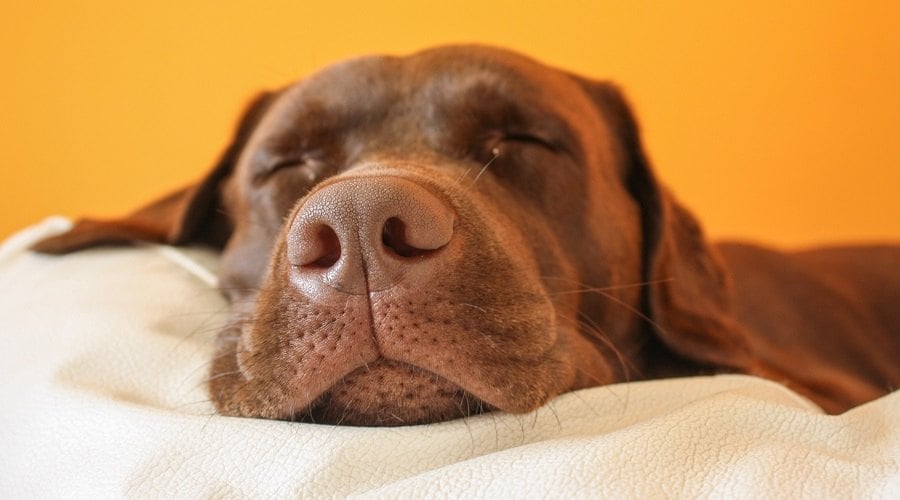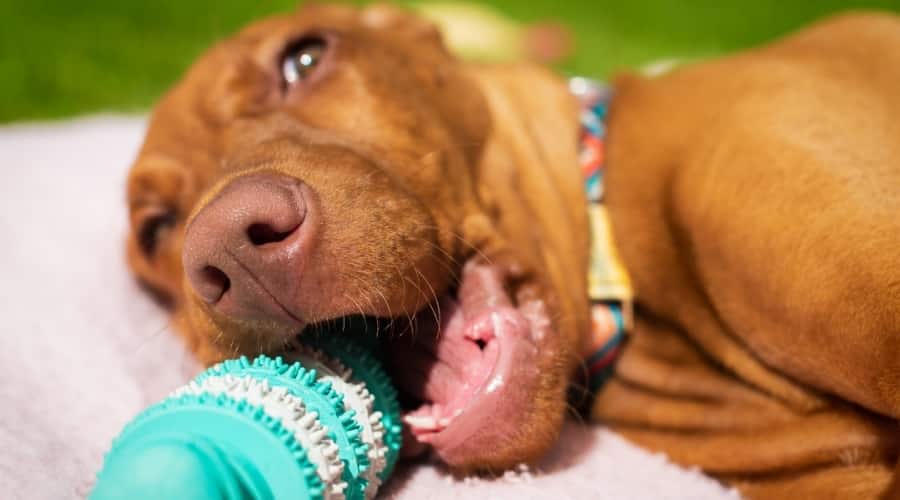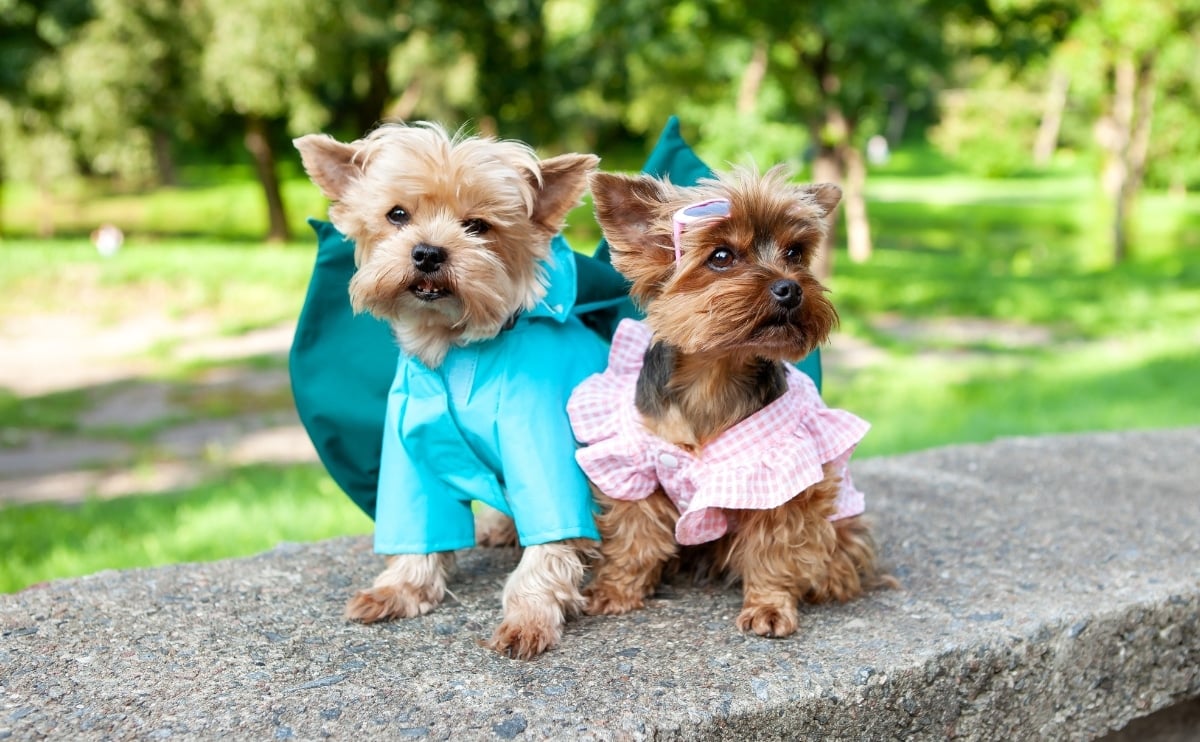Dog Ate a Poinsettia? Here’s What Vets Actually Say About It
When you purchase through links on our site, we may earn a commission. Here’s how it works.
Your dog just ate your Christmas poinsettia, and now you’re Googling in full panic mode. You’ve heard poinsettias are poisonous to dogs, but are they really as deadly as everyone says?
Table of Contents
The truth: this festive red plant isn’t the nightmare TikTok claims it is. I spoke with Dr. Ellen Marcinkiewicz, a small animal veterinarian, to find out what actually happens when dogs chew on poinsettias and when you should (and shouldn’t) worry.
Are Poinsettias Bad for Dogs?
If your dog ate a poinsettia, don’t freak out just yet. Let’s clear this up once and for all: yes, poinsettias are technically poisonous to dogs, but only in the mildest sense of the word.
The white sap inside poinsettia leaves contains natural compounds that can irritate a dog’s eyes, mouth, throat, and stomach. But here’s what vets want you to know: it takes a lot of plant material to cause serious trouble. Most dogs spit it out long before they eat enough to do real harm.
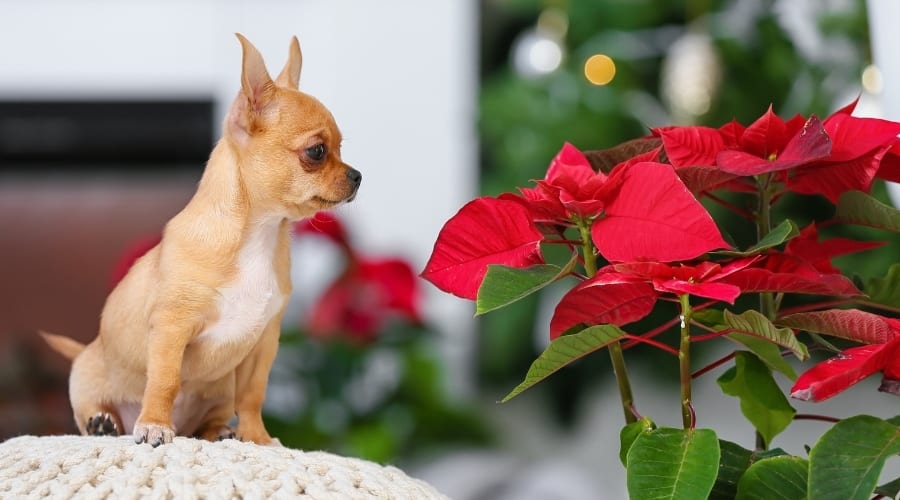
So while “poinsettia poisoning in dogs” sounds scary, most cases look more like a temporary upset stomach than a toxic emergency. If your dog ate a poinsettia leaf or two, you’re probably dealing with a mild reaction, not a holiday disaster.
Still, it’s smart to keep your vet in the loop, especially if your dog is small, ate a large amount, or isn’t acting like their usual self.
I spoke with Dr. Ellen Marcinkiewicz, who has this to say about poinsettias and dogs:
If your dog ate poinsettia, there’s no need to panic. Despite their notorious reputation as extremely poisonous, poinsettias are only mildly toxic to dogs.
The white sap from poinsettia plants contains chemicals that cause irritation. When the sap comes into contact with your dog’s mouth and stomach, it causes temporary irritation. This may show up in warning signs such as heavy panting, drooling and vomiting.
– Dr. Ellen Marcinkiewicz, Veterinarian Contributor to Canine Journal
4 Poinsettia Myths You Can Stop Believing
The internet loves a good pet panic, but most of what you’ve heard about poinsettias and dogs just isn’t true. Let’s bust the biggest myths before you bubble-wrap your living room.
1. Poinsettias Can Kill Your Dog
Nope. Even if your dog ate a poinsettia, it’s extremely unlikely to be fatal. The sap is irritating, not lethal.
Truth: At worst, expect drool, mild vomiting, or a temporary “ew, that tasted weird” face.
2. Every Part of the Plant Is Highly Toxic
Dr. Ellen Marcinkiewicz says, “The plant sap contains the irritating chemicals responsible for its toxic effects. The sap is found in the poinsettia plant’s branches and leaves. Though we tend to think of the red part as the petals or flowers, they are actually leaves that contain the same irritating substance.”
While all parts contain the milky sap, vets say the dose makes the danger. One nibble on a leaf won’t compare to a full bouquet buffet.
Truth: Size and amount matter; tiny dogs or puppies need closer monitoring.
3. Poinsettias Are the Most Dangerous Christmas Plant
Actually, mistletoe, holly berries, and lilies rank far higher on the pet-poison scale.
Truth: Poinsettias are the drama queens of the holiday plant world – loud reputation, mild effect.
Keep Your Pup Safe All Season. Poinsettias aren’t the only holiday hazard hiding around the house. From tinsel to table scraps, some festive favorites can spell trouble for pets. Read our full guide to holiday dangers for dogs to learn what to watch for and how to keep every celebration safe.
4. You Must Rush to the ER Immediately
Not unless your dog can’t stop vomiting or swallowed decorations with the plant.
Truth: In most cases, call your vet for advice and keep an eye on your pup at home.
What Really Happens When Dogs Eat Poinsettias
So what actually happens when your dog eats a poinsettia? Most of the time, not much, aside from a mild stomach reaction.
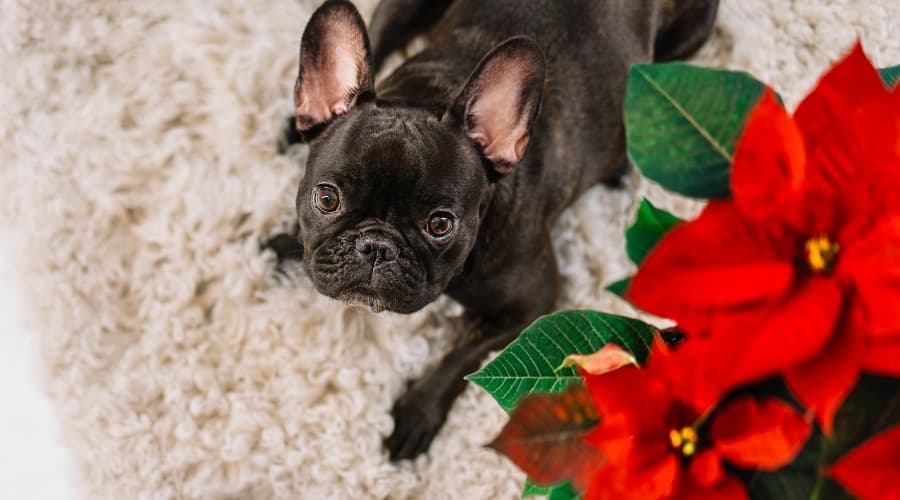
How Much Is Too Much?
If your dog only nibbled on a few leaves, symptoms are usually short-lived and resolve within a few hours. The effects depend on two main things: how much of the plant was eaten and the size of your dog.
Puppies and toy breeds are more sensitive because even a small bite represents a larger dose for their body weight.
Most cases of poinsettia poisoning in dogs don’t require medical treatment. In rare situations, such as when a dog eats a large quantity or already has a sensitive stomach, your vet might recommend anti-nausea medication or fluids to help them recover faster.
Quick Takeaway Box
- Typical reaction: mild drooling, short-term vomiting, or temporary stomach upset.
- When to worry: repeated vomiting, lethargy, or refusal to eat for more than 12–24 hours.
- Call your vet: Always for advice, especially if your dog is very young, small, or has eaten more than a few leaves.
Poinsettia and Dogs: Common Symptoms to Watch For
If your dog ate a poinsettia, you’ll likely notice symptoms within the first few hours. Most are mild and go away on their own, but it helps to know what’s normal and what’s not.
Here’s what to look for after your dog takes a bite of this festive plant.
Mild, Common Reactions
Here’s what Dr. Ellen Marcinkiewicz has to say about the most common reactions when a dog eats a poinsettia:
Irritation to Skin or Eyes
The eye area is extremely sensitive, and your dog can easily scratch their eye when trying to relieve the discomfort. Carefully washing the skin with cool water can help remove poinsettia sap. If you have any concerns or the signs are not improving, contact your veterinarian.
Irritation of the Mouth
The chemicals in the sap of the poinsettia plant may also irritate the mouth when the leaves or branches have been bitten and chewed. You may notice Fido licking their lips more often than normal, drooling, or pawing at their mouth.
In most cases, these effects will resolve with time. However, they should be reported to a veterinarian if they don’t disappear over the next 12-24 hours.
Gastrointestinal Upset
Ingestion of the poinsettia plant can also cause an upset tummy, again due to direct irritation of the digestive tract. Signs such as vomiting, reduced appetite, mild lethargy, and diarrhea can be seen in dogs that have eaten poinsettia.
These effects are usually dose-dependent and increase with the amount of poinsettia consumed. In most cases, the gastrointestinal signs associated with poinsettia ingestion are transient and will resolve on their own.
Your vet will advise you on a suitable feeding protocol for your dog. Usually, small, frequent feeds are best after a gut upset. A veterinarian-approved gastrointestinal diet can also be helpful.
Small dogs, especially puppies, are more sensitive to tummy upsets. Puppies and small dogs can become dehydrated easily and can even become hypoglycemic (low blood sugar levels) if they stop eating. They need to be monitored closely. Any changes should be reported to your veterinarian immediately.
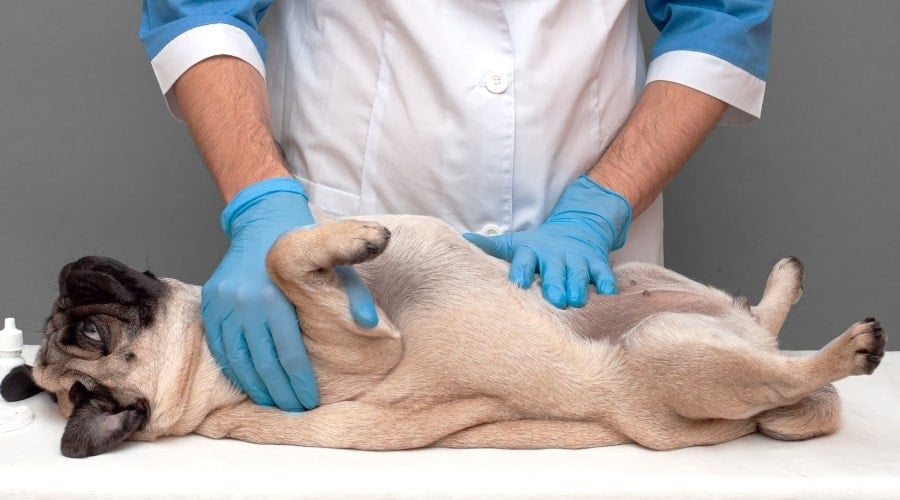
When It Might Be More Serious
- Repeated vomiting or diarrhea that lasts more than a few hours.
- Excessive drooling or foam around the mouth.
- Lethargy or weakness.
- Refusal to eat or drink for an entire day.
These more intense symptoms are rare and often linked to small dogs, puppies, or those that ate a larger amount of the plant. If you notice any of these, call your vet for advice immediately.
Puppy vs. Adult Dogs: Who’s at Greater Risk Of Poinsettia Poisoning?
When it comes to poinsettias and dogs, age and size make a real difference. Puppies and small-breed dogs are more likely to react strongly if they chew or swallow pieces of the plant.
Adult dogs, especially larger breeds, usually need to eat a significant amount before showing any symptoms. Most will stop after one or two bites because the plant tastes bitter and unpleasant.
Here’s what Dr. Ellen Marcinkiewicz has to say:
The toxic effects of poinsettia increase with the dose consumed. This means small dogs and puppies, or dogs that have eaten a large amount of poinsettia, are at increased risk of developing more severe clinical signs. So, if Fido has eaten or chewed on a poinsettia plant, contact your veterinarian for advice.
What to Do If Your Dog Ate a Poinsettia (Vet’s 6 Steps + Home Care)
If your dog ate a poinsettia, don’t panic. In most cases, this isn’t an emergency. Still, there are a few smart steps to make sure your pup stays comfortable and safe. Here are a few of the steps Dr. Ellen Marcinkiewicz says to follow:
Step 1: Remove the Plant
Make sure all traces of the plant have been cleared away and cannot be reached by any of your pets at home. It may be best to temporarily confine your animals in a separate room while you tidy.
Step 2: Wipe Your Dog’s Mouth
Use a damp cloth to gently wipe around their mouth and lips. This helps remove the sap that can irritate their skin and gums.
Step 3: Watch for Symptoms
It’s rare for dogs to become seriously ill after eating poinsettia. But if your dog is sick, collapsed, or appears severely unwell, take them to the nearest emergency vet immediately.
Keep an eye out for drooling, mild vomiting, or changes in appetite. Most dogs show only brief signs that fade within a few hours.
Examine your dog closely. Are they bright and comfortable? Do you see any unusual behavior? Are they licking their lips or pawing at their mouth and face? Has there been vomiting or diarrhea?
Step 4: Collect Information
Try to work out how much of the plant was consumed. You might be able to piece together bits of the remaining plant (be careful – the sap can irritate human hands, too).
That will allow you to check the plastic pot to see if any pieces are missing. Make sure no other Christmas decorations, such as tinsel or ornaments, are missing or have been chewed up. More on this shortly…
Step 5: Call Your Veterinarian
Give them all the information you’ve gathered, and let them know your dog’s breed, age, and weight. Your vet can advise you on the best course of action, whether it’s safe to monitor your dog at home or if they need to come into the clinic for an examination.
Step 6: Offer Water and Rest
Encourage your dog to drink small amounts of water. A bland diet, such as boiled chicken and rice, can help settle an upset stomach if needed.
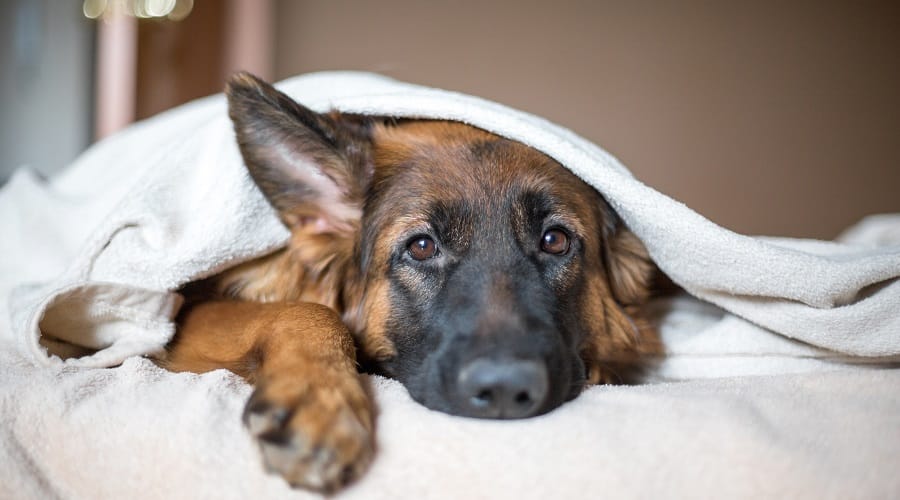
The Real Danger: The Plastic Pot & Decorations
When people think about poinsettias and dogs, they usually worry about the plant’s toxicity, but the bigger risk often comes from what’s around the plant.
Many poinsettias are sold in shiny plastic pots, wrapped in plastic or foil, or decorated with ribbons, glitter, or small ornaments. If your dog ate a poinsettia along with any of these extras, that’s when you need to pay closer attention.
Dr. Ellen Marcinkiewicz has this to say:
Though not poisonous, it’s also important to remember that the plastic pot many poinsettia plants are kept in can be dangerous to dogs if chewed up and swallowed. Sharp pieces of plastic can injure your dog’s mouth and digestive tract.
Larger pieces of plastic are a choking hazard and can even cause blockage (intestinal obstruction). This is especially true in small dogs. Call your vet immediately if you think your pup has chewed up and swallowed plastic or any other inedible Christmas decorations.
Signs of intestinal obstruction are vomiting (often multiple times), struggling to pass feces, reduced appetite, struggling to keep down food/water, and diarrhea.
If you suspect your pet has eaten any of these items or is showing signs of a blockage, contact your vet immediately. This is considered an emergency and should be assessed as soon as possible.
Unlike the plant itself, swallowed plastic isn’t something that will pass safely on its own, and they may require surgery to remove it.
Quick Takeaway Box
- The poinsettia isn’t the main threat; the packaging is.
- Watch for: repeated vomiting, straining, or a bloated belly.
- Call your vet right away if your dog may have swallowed plastic or decorations.
Poinsettia Poisoning in Dogs: Treatment & Recovery
If your dog reacts badly after eating a poinsettia, the good news is that treatment is usually simple and focused on comfort. Most cases of poinsettia poisoning in dogs do not require hospitalization or aggressive care.
Dr. Ellen Marcinkiewicz says:
There is no antidote for poinsettia. Treatment is targeted at managing the clinical signs. Your vet might prescribe medications to help settle an upset tummy. They may also prescribe eye ointment to soothe and protect irritated eyes.
A small dog or puppy may require intravenous fluids (IV drip) in the hospital if they become severely dehydrated, though this is relatively rare.
You can help your dog recover faster by keeping them hydrated, offering small, frequent meals, and avoiding treats or rich foods until they’re back to normal. Most dogs recover fully within 24 hours and never look at a poinsettia again.
How Do I Stop My Dog From Eating My Plants?
The easiest way to prevent your dog from eating poinsettias is to keep them out of your home or garden. However, keeping it on a high shelf where they cannot reach it is also a sensible option (unless you have a cat!).
Keep an eye out for poinsettia displays on walks over the festive period. You should also always make sure to keep your dog leashed in public places. This will help prevent them from eating things they shouldn’t.
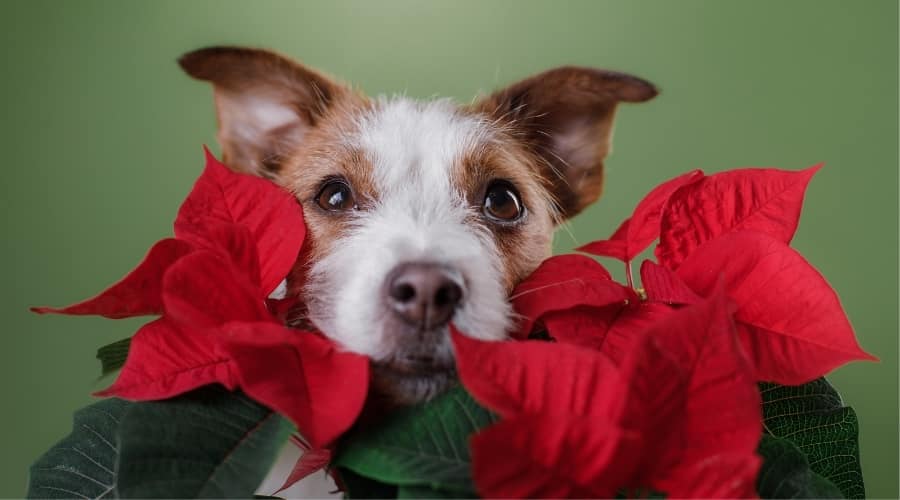
5 Other Christmas Plants That Can Harm Dogs
While poinsettias and dogs don’t make a great mix, this festive plant isn’t the most dangerous one in your holiday lineup. Several other common Christmas decorations can cause much more serious reactions in dogs. Knowing what to avoid can help you keep your home cheerful and your pup safe.
1. Mistletoe
Both American and European mistletoe contain toxins that can affect the heart and nervous system. Even small amounts can cause vomiting, drooling, or, in severe cases, heart rhythm problems.
2. Holly
Holly leaves and berries are more toxic than poinsettias. The spiky leaves can irritate the mouth and throat, and the berries can cause vomiting, diarrhea, or dehydration.
3. Lilies
Lilies are extremely toxic to cats and can also upset a dog’s digestive system. If your household has both cats and dogs, skip these entirely.
4. Amaryllis
This bright red flower is a holiday favorite but contains chemicals that can trigger vomiting, tremors, and abdominal pain in dogs.
5. Christmas Tree Water
Even plain tree water can cause issues if it’s mixed with fertilizer, aspirin, or preservatives. Keep your dog from drinking out of the tree stand.
Know What Other Plants Could Harm Your Dog. Poinsettias are only one of many plants that can cause trouble for curious pups. Check out our complete guide to poisonous plants for dogs to see which ones to avoid and how to keep your home pet-safe year-round.
4 Safer Holiday Plant Alternatives for Pet Homes
If you love decorating but want to avoid worrying about poinsettias and dogs, there are plenty of pet-safe plants that still bring that festive, winter feel. These options look beautiful, won’t harm your pets, and can help you keep the holidays stress-free.
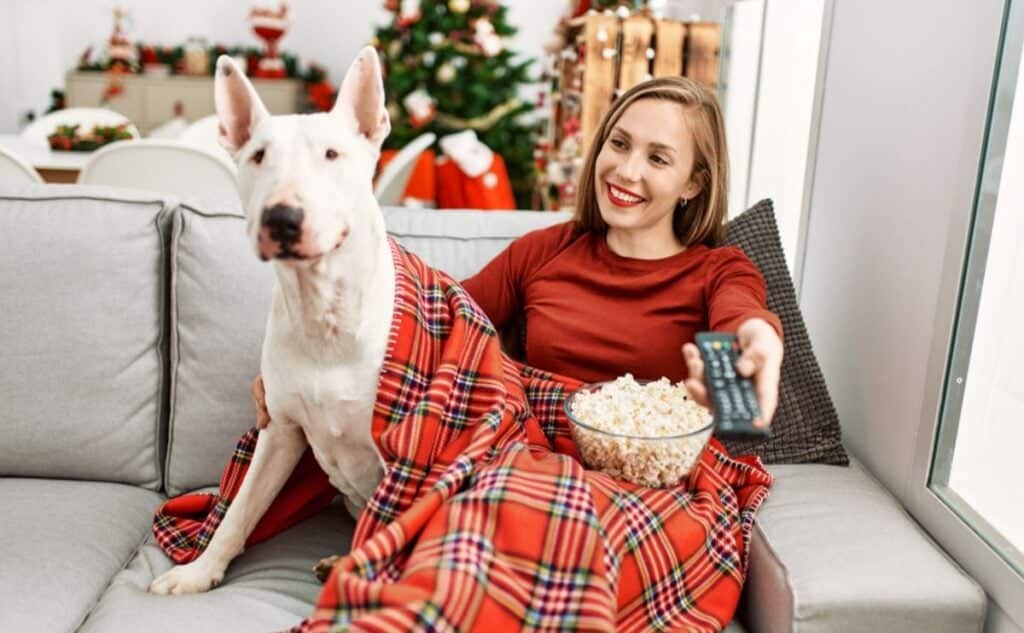
1. Christmas Cactus
A favorite among pet owners, the Christmas cactus adds bright blooms without any toxic sap. It’s easy to care for and safe for both dogs and cats.
2. Roses
Fresh roses make a great substitute for poinsettias. Just be sure to trim any thorns before displaying them where pets can reach.
3. Orchids
Elegant and non-toxic, orchids are a stylish choice for centerpieces or windowsills.
4. African Violet
Soft, colorful, and completely safe for pets, African violets offer a cheerful pop of color all season long.
Final Thoughts: Don’t Panic, Just Be Plant Smart
So, if your dog ate a poinsettia, take a breath. This classic holiday plant has a dramatic reputation it doesn’t really deserve. While poinsettias are mildly poisonous to dogs, they rarely cause anything more than a short-lived upset stomach or a bit of drool.
That said, being a pet owner means staying one step ahead. Keep poinsettias and other Christmas plants out of reach, double-check for loose decorations or plastic wrappings, and always have your vet’s number handy, just in case curiosity strikes again.
Poinsettias may not be the villains the internet makes them out to be, but a little prevention goes a long way toward keeping your dog safe (and your holiday stress-free).
Here is Dr. Ellen Marcinkiewicz’s final word on poinsettias and dogs:
It is always best to seek veterinary advice if your dog ate poinsettia. The effects (though dose-dependent) are not always predictable and certain dogs such as puppies and small breeds are at higher risk for developing complications.
FAQs About Poinsettias and Dogs
You’re not the only pet parent who’s panicked after seeing their dog munch on a poinsettia. Here are answers to the most common questions about poinsettias and dogs, based on veterinary insight, research, and real cases.
If you still have questions, drop them in the comments, and we’ll add updates to help other readers, too.
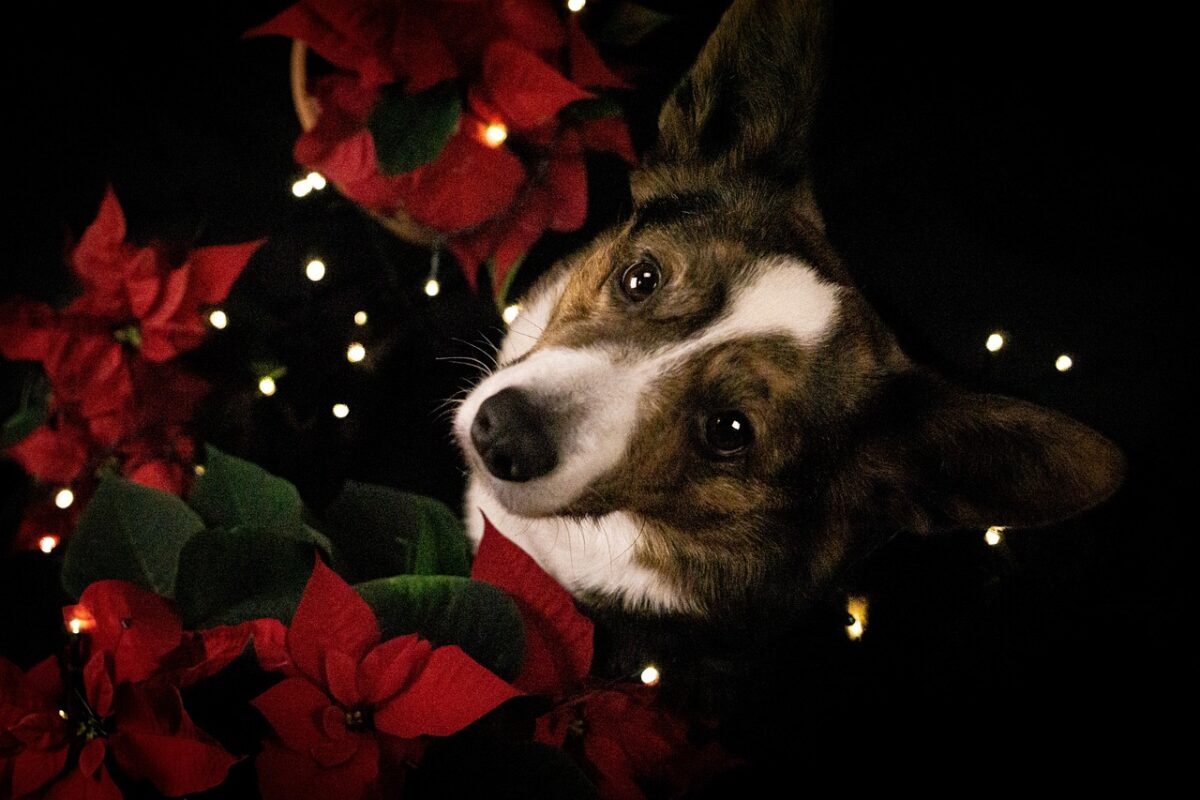
Are Poinsettias Poisonous To Dogs?
Yes, but only mildly. Poinsettias contain a sap that can irritate a dog’s mouth and stomach, but rarely causes anything serious or life-threatening.
Some studies have also suggested that certain plants, like poinsettia, contain an enzyme that may play a role in the development of gastritis (inflammation of the stomach, causing vomiting). The sap can also irritate your canine companion’s skin and eyes if it comes into contact.
Can A Poinsettia Kill A Dog?
No. Fatal cases are almost unheard of. The plant’s toxins cause discomfort, not death, unless a dog eats a very large amount, something most won’t do because it tastes bitter.
Puppies and small-breed dogs, in particular, can become unwell and dehydrated quickly if they stop eating and develop vomiting and diarrhea. Which is why you will need to monitor your pup closely, and it’s always best to seek advice from a veterinary professional.
What Happens If My Dog Ate A Poinsettia?
You might see drooling, vomiting, or a temporary loss of appetite. Most dogs recover on their own within a day. Whilst these signs are usually self-limiting, it’s always best to seek veterinary advice.
Should I Make My Dog Vomit After Eating A Poinsettia?
No, don’t try to make your dog vomit at home. In the case of poinsettia, vomiting is unlikely to help reduce the symptoms and may even make them worse. Call your veterinarian instead; they’ll let you know if any treatment is necessary.
Never attempt to make your dog vomit after eating poinsettia or any other toxic item. The decision to induce vomiting should only ever be made by a veterinary professional who will perform the procedure as safely as possible if it is required.
Is Poinsettia Safe For Puppies?
Puppies are more sensitive because of their size, so monitor closely if they’ve chewed on the plant. Contact your vet if vomiting or lethargy lasts more than a few hours.
Are Poinsettias Bad For Other Pets Too?
Yes, cats can also experience mild stomach upset or drooling after chewing on poinsettias. The same “mildly toxic” rule applies, unpleasant, but rarely dangerous.
Is There an Antidote for Poinsettia Poisoning?
There is no antidote for poinsettia toxicity, but if a dog eats it, the effects are usually mild and may include drooling, vomiting, and diarrhea, as well as irritation of the mouth, eyes, and skin.
What Is A Poinsettia?
Poinsettias (Euphorbia pulcherrima) are traditionally grown in Mexico and Central America. It’s also known as the Christmas flower, Christmas star, lobster flower plant, or Flores de Noche Buena (Flowers of the Holy Night).
Many of us love to decorate our homes with festive red poinsettia plants during the holiday season. With their instantly recognizable star-shaped leaves, they’re a Christmas classic. More than 35 million poinsettia plants are sold every year across the US!
Keep Your Dog Safe, Happy & Busy
If your dog can’t resist nibbling on houseplants, it might be time to take action. Check out our guide to the best anti-chew sprays for dogs to help protect your holiday decorations and furniture.
Looking for a quick fix? A bitter apple spray for dogs is a vet-approved classic that can discourage unwanted biting in seconds. You can also redirect your dog’s curiosity with the best interactive toys, perfect for keeping their mind busy when boredom strikes.
And if your pup simply loves to chew, make it a healthy habit with our picks for the best chew toys for dogs. All are durable, safe, and guaranteed to save your plants.
Share Your Poinsettia Story! Has your dog ever snuck a bite of a poinsettia or another holiday plant? Tell us what happened in the comments. Your story could help other pet parents stay calm and informed this season.

